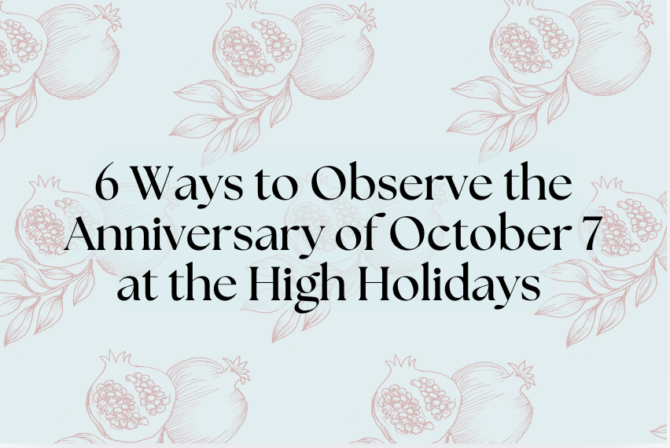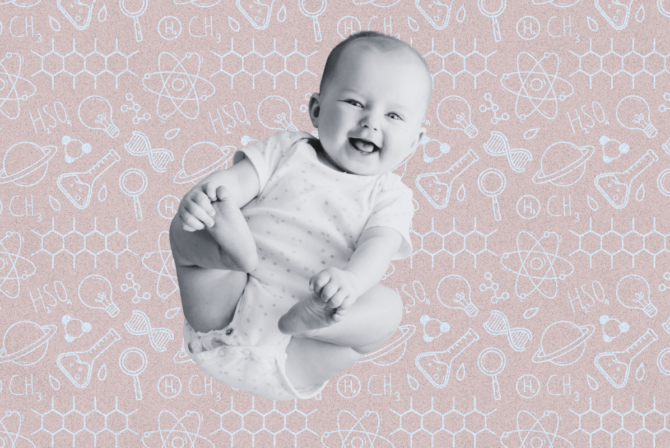When my dad was a little boy in Moscow, his grandparents would send matzah from the Ukrainian countryside to the family. My dad’s parents would caution him not to eat it outside the apartment, on the streets, so that no one would know he was Jewish.
Despite what they gained by moving from the country to the city, in terms of economic and educational opportunity, they lost something profound and unquantifiable.
My great-great-grandparents had strong Jewish and Yiddish names: Solomon, Israel, Dinah, Reuven, Abraham, Leib, Joseph. After them, our names became Russified. When communism took hold, God had to get off his pedestal, and the cultural norm of atheism was so strong that anything resembling worship, ritual or religious practice seemed primitive, absurd.
By the time I came around, my definition of Jewishness was nothing more than the Holocaust and antisemitism. To define yourself by these things is an incredibly impoverished experience, a dimly lit view of Judaism. It’s like trying to keep warm by staring at a picture of a fireplace. Now that I’ve been welcomed into the inner chamber — or one of them — I can feel the fire kissing my skin, I can hear its roar. It’s resplendent, glorious, beautiful, intense. And I’m sitting around the fire too, participating, tending to it. The richness of my culture, my religion, my heritage is alive.
Growing up in Melbourne, Australia, I lived right in the “cholent pot” of the Jewish community, but going to a public school, I didn’t meet a single Jewish person outside of my family until I was 18.
On the first day of classes at University, a girl wandered up to me to ask if I was Mormon. I was going through a vintage dressing phase, and not pulling it off the way I imagined. I told her I was Jewish. She was, too. That was Becky — my first Jewish friend, and one of my best friends still today.
She took me under her wing and said lots of exciting things like “free trip to Israel” and “go to Chabad, they have good food.” She taught me the candle lighting prayer and introduced me to her friends, who all attended a private Jewish girls school. I enrolled in one Jewish studies subject and that turned into a Minor in Jewish studies. I was hooked on learning about my people.
Still, it was hard to translate academic knowledge into a sense of belonging in the Jewish community. Almost every Jewish person I met had their crew of friends. They had all known each other since the womb. Trying to gain a foothold in Jewish cultural and religious life was proving difficult. It was a way of life that I hadn’t grown up with, and that came with a language, slang, songs, prayers and rituals that were both my heritage, yet completely foreign to me.
It wasn’t until I swiped right on Tinder on a rabbi’s son who lived less than 1 kilometer away that I truly entered the community. He had casual and effortless access to Shabbat and major holiday invitations, a big Jewish family and an intimate knowledge of Judaism and Jewish-ness. Our wedding and marriage has brought so much joy and Jewish ritual into my life — we were married by his father, under a chuppah, in Israel.
Unlike my ancestors, I am incredibly fortunate to be living in a time and a place where I have the freedom to once again engage with and explore my Jewishness. I know I would not be here without the immense sacrifice, hard work and conscious choices of my family.
Over the years I have been asked my Hebrew name. At first, the idea that I should have one sparked resistance and indignation. Did no one understand the Soviet plight? More recently, the idea of adopting a Hebrew name for myself has symbolized a return to the fold. One that I’m consciously choosing for myself and my future children.
The process of finding the right name was a creative and joyful experience as I channeled new born energy to see what fit. I researched names and their meanings, what stories they related to in the Torah, and created a short list of top contenders. I took eight names to my Parsha circle, a group of women who had witnessed my journey and evolution over the course of the Torah-reading cycle. They voted on a name, and in the end I chose two: Ma’ayan Meira.
Ma’ayan is water. Not still water like a mikveh, but moving water, like a spring. It represents an openness to life, to change, to expansion. It’s fluid, ever changing. Flowing with life.
For me, it’s also birthing waters, birthing something new into my life, and for my family line. It’s fresh and refreshing, and reminds me to find what excites and enlivens me within our tradition and move towards it without judgment.
Meira is an illuminating light. It is the light of a family Shabbat table. The light of the oil candles in my husband’s family’s homes across Israel — a family who show me what love and warmth look like, even across the seas. It is the light of my friends and community who guide me and show me the way. Friends I know I will be having a lifelong conversation with about what it means to be Jewish, to wrestle with God, and to be a Jew in the diaspora.
Receiving my Hebrew name, Ma’ayan Meira, at the age of 30, feels like rectification for my ancestors — fixing something that was lost or broken. I’m not subtracting the name my parents chose for me, Michelle. Michelle got me here today. But I’m adding Ma’ayan and Meira, because when you’ve waited this long to have a Hebrew name, you deserve two!








